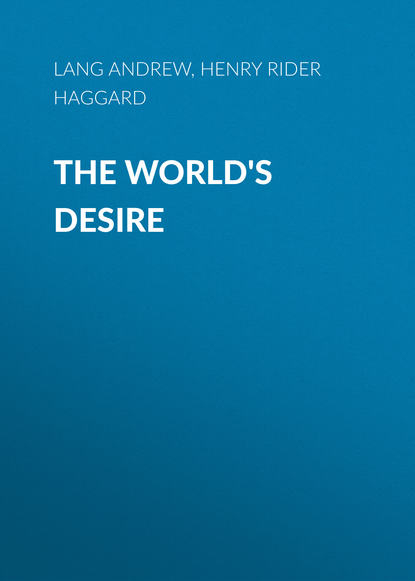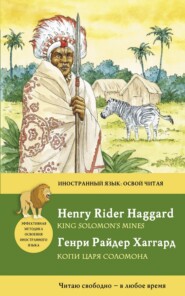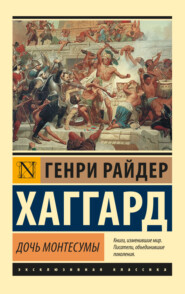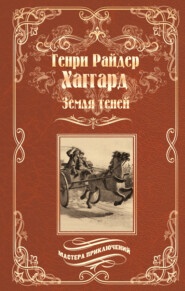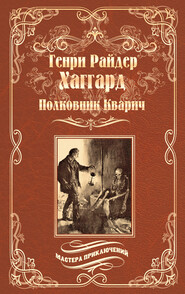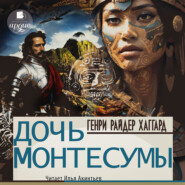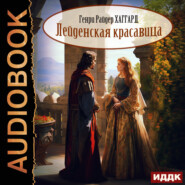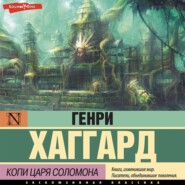По всем вопросам обращайтесь на: info@litportal.ru
(©) 2003-2024.
✖
The World's Desire
Настройки чтения
Размер шрифта
Высота строк
Поля
The Wanderer lay dying on the ground, there by the river-bank, and the light of the burning ships flamed on his golden armour, and on the Star at Helen’s breast.
“Why do the soldiers shout?” he asked, lifting his head from Helen’s breast.
“They shout because Meriamun the Queen is come,” Rei answered.
“Let her come,” said the Wanderer.
Now Meriamun sprang from her chariot and walked, through the soldiers who made way, bowing before her royalty, to where the Wanderer lay, and stood speechless looking on him.
But the Wanderer lifting his head spake faintly:
“Hail! O Queen!” he said, “I have accomplished the charge that Pharaoh laid upon me. The host of the Nine-bow barbarians is utterly destroyed, the fleet of the Aquaiusha is burned, or fled, the land of Khem is free from foes. Where is Pharaoh, that I may make report to him ere I die?”
“Pharaoh is dead, Odysseus,” she answered. “Oh, live on! live on! and thyself thou shalt be Pharaoh.”
“Ay, Meriamun the Queen,” answered the Wanderer, “I know all. The Pharaoh is dead! Thou didst slay Pharaoh, thinking thus to win me for thy Lord, me, who am won of Death. Heavily shall the blood of Pharaoh lie upon thee in that land whither I go, Meriamun, and whither thou must follow swiftly. Thou didst slay Pharaoh, and Helen, who through thy guile is lost to me, thou wouldst have slain also, but thou couldst not harm her immortality. And now I die, and this is the end of all these Loves and Wars and Wanderings. My death has come upon me from the water.”
Meriamun stood speechless, for her heart was torn in two, so that in her grief she forgot even her rage against Helen and Rei the Priest.
Then Helen spoke. “Thou diest indeed, Odysseus, yet it is but for a little time, for thou shalt come again and find me waiting.”
“Ay, Odysseus,” said the Queen, “and I also will come again, and thou shalt love me then. Oh, now the future opens, and I know the things that are to be. Beneath the Wings of Truth shall we meet again, Odysseus.”
“There shall we meet again, Odysseus, and there thou shalt draw the Veil of Truth,” said the Helen.
“Yea,” quoth the dying Wanderer; “there or otherwhere shall we meet again, and there and otherwhere love and hate shall lose and win, and die to arise again. But not yet is the struggle ended that began in other worlds than this, and shall endure till evil is lost in good, and darkness swallowed up in light. Bethink thee, Meriamun, of that vision of thy bridal night, and read its riddle. Lo! I will answer it with my last breath as the Gods have given me wisdom. When we three are once more twain, then shall our sin be purged and peace be won, and the veil be drawn from the face of Truth. Oh, Helen, fare thee well! I have sinned against thee, I have sworn by the Snake who should have sworn by the Star, and therefore I have lost thee.”
“Thou hast but lost to find again beyond the Gateways of the West,” she answered low.
Then she bent down, and taking him in her arms, kissed him, whispering in his ear, and the blood of men that fell ever from the Star upon her breast, dropped like dew upon his brow, and vanished as it dropped.
And as she whispered of joy to be, and things too holy to be written, the face of the Wanderer grew bright, like the face of a God.
Then suddenly his head fell back, and he was dead, dead upon the heart of the World’s Desire. For thus was fulfilled the oath of Idalian Aphrodite, and thus at the last did Odysseus lie in the arms of the Golden Helen.
Now Meriamun clasped her breast, and her lips turned white with pain. But Helen rose, and standing at the Wanderer’s head looked on Meriamun, who stood at his feet.
“My sister,” said Helen to the Queen; “see now the end of all. He whom we loved is lost to us, and what hast thou gained? Nay, look not so fiercely on me. I may not be harmed of thee, as thou hast seen, and thou mayest not be harmed of me, who would harm none, though ever thou wilt hate me who hate thee not, and till thou learnest to love me, Sin shall be thy portion and Bitterness thy comfort.”
But Meriamun spoke no word.
Then Helen beckoned to Rei and spake to him, and Rei went weeping to do her bidding.
Presently he returned again, and with him were soldiers bearing torches. The soldiers lifted up the body of the Wanderer, and bore it to a mighty pyre that was built up of the wealth of the barbarians, of chariots, spears, and the oars of ships, of wondrous fabrics, and costly furniture. And they laid the Wanderer on the pyre, and on his breast they laid the black bow of Eurytus.
Then Helen spoke to Rei once more, and Rei took a torch and fired the pyre so that smoke and flame burst from it. And all the while Meriamun stood by as one who dreams.
Now the great pyre was a mass of flame, and the golden armour of the Wanderer shone through the flame, and the black bow twisted and crumbled in the heat. Then of a sudden Meriamun gave a great cry, and tearing the snake girdle from her middle hurled it on the flames.
“From fire thou camest, thou Ancient Evil,” she said in a dead tongue; “to fire get thee back again, false counsellor.”
But Rei the Priest called aloud in the same tongue:
“An ill deed thou hast done, O Queen, for thou hast taken the Snake to thy bosom, and where the Snake passes there thou must follow.”
Even as he spoke the face of Meriamun grew fixed, and she was drawn slowly towards the fire, as though by invisible hands. Now she stood on its very brink, and now with one loud wail she plunged into it and cast herself at length on the body of the Wanderer.
And as she lay there on the body, behold the Snake awoke in the fire. It awoke, it grew, it twined itself about the body of Meriamun and the body of the Wanderer, and lifting its head, it laughed.
Then the fire fell in, and the Wanderer and Meriamun the Queen, and the Snake that wrapped them round, vanished in the heart of the flames.
For awhile the Golden Helen stood still, looking on the dying fire. Then she let her veil fall, and turning, wandered forth into the desert and the night, singing as she passed.
And so she goes, wandering, wandering, till Odysseus comes again.
Now this is the tale that I, Rei the Priest, have been bidden to set forth before I lay me down to sleep in my splendid tomb that I have made ready by Thebes. Let every man read it as he will, and every woman as the Gods have given her wit.
PALINODE
Thou that of old didst blind Stesichorus, If e’er, sweet Helen, such a thing befell, We pray thee of thy grace, be good to us, Though little in our tale accordeth well With that thine ancient minstrel had to tell, Who saw, with sightless eyes grown luminous, These Ilian sorrows, and who heard the swell Of ocean round the world ring thunderous, And thy voice break when knightly Hector fell!
And thou who all these many years hast borne To see the great webs of the weaving torn By puny hands of dull, o’er-learned men, Homer, forgive us that thy hero’s star Once more above sea waves and waves of war, Must rise, must triumph, and must set again!
notes
1
Cyprus.
2
Probably the mysterious and indecipherable ancient books, which were occasionally excavated in old Egypt, were written in this dead language of a more ancient and now forgotten people. Such was the book discovered at Coptos, in the sanctuary there, by a priest of the Goddess. “The whole earth was dark, but the moon shone all about the Book.” A scribe of the period of the Ramessids mentions another indecipherable ancient writing. “Thou tellest me thou understandest no word of it, good or bad. There is, as it were, a wall about it that none may climb. Thou art instructed, yet thou knowest it not; this makes me afraid.”
Birch, Zeitschrift, 1871, pp. 61-64. Papyrus Anastasi I, pl. X. 1. 8, pl. X. 1. 4. Maspero, Hist. Anc., pp. 66-67.
3
Gold.





